News from Inside the Vatican
A publication of Urbi et Orbi Communications
The spark is becoming a flame
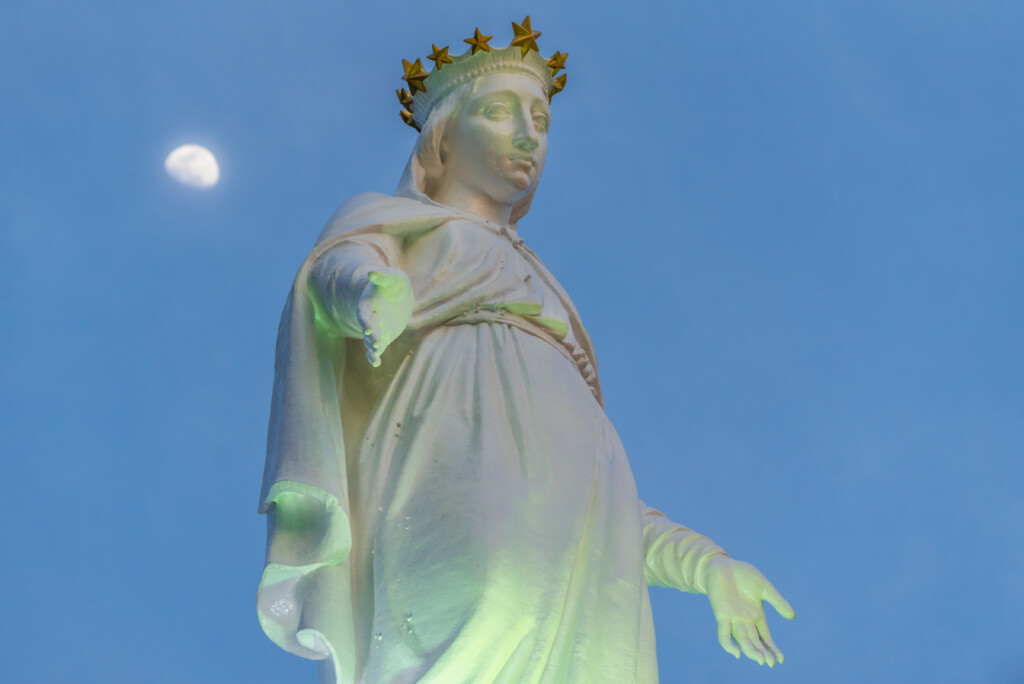
The statue in of the Shrine of Our Lady of Lebanon in Harissa, east of Beirut
Dear Friends,
Praised be the Lord Jesus Christ, who has brought us out of darkness into His Light!
Sometimes it looks as if the darkness is still pressing in around us, but the Light is, after all, within us, and it is up to us to shed that light into the surrounding world. This is why we first conceived of our Unitas: Come, Rebuild My Church initiative and set it into motion last year, and that is why we continue to expand its work in three main areas of “Unity”: unity of each soul with God; unity within the Catholic Church; unity between Catholics and the Orthodox, our brothers in faith and sacrament.
Our Unitas Centers, centers intended to foster unity between each soul and God, are coming into being through dialogue we are conducting with leaders in Assisi and the United States. We intend them to be loci of worship, spiritual enrichment and theological insight that welcome Catholics from all walks of life.
We continue to pursue the cause of unity within our Church, principally through covering key issues for all Catholics in our flagship publication, Inside the Vatican magazine, and through online discussions, videos and guest appearances on other platforms. One example: our release of “The Franco Tapes” grappled with important debates within Catholicism; they are now available on our YouTube channel.
With regard to unity with the Orthodox, Lebanon has become a focus for us. It is a place where Catholics and Orthodox can walk together even as events in Ukraine and elsewhere pull them apart. Unitas is working with our friends in Lebanon, both Catholic and Orthodox, to help struggling Christians to thrive again, and remain in the land where Jesus Himself once walked. Even Muslims and Christians can learn to respect one another if Lebanon becomes once again, in the words of John Paul II, “a message of peace.”
In the past several years, the world has seen Christians, and all people, pitted against one another – by the Covid pandemic, controversy over vaccinations and bodily autonomy, and now a conflict between Russia and Ukraine. Unitas is working in Ukraine as well, to bring relief to the victims of war, a war Pope Francis himself vocally opposes. Unitas is now planning a roundtable in Assisi, a forum in which religious and lay leaders can bring fresh insights to the quest for peace.
Our work to bring the Light into the darkness is now more important than ever.
As the great hermit saint of Lebanon, St. Charbel reminds us: “Every person is a torch of light; our Lord created him to illumine the world.”
In Christ,
![]()
Editor,
Inside the Vatican magazine
Founder and President,
Urbi et Orbi Communications
Unitas Update: Striving for Unity in a Time of Division
It has been a busy year at Urbi et Orbi Communications, all the more so because we have been busy implementing the Year One objectives of our flagship initiative: Unitas: Come Rebuild My Church. Over the first half of 2022, as part of the Unitas initiative, we have continued our work in Lebanon, begun a new project in Ukraine, and continued planning for our exclusive Unitas Signature Event, which will be held on October 4, 2022 in the Washington, D.C. area.
In addition, we have been in talks to hold international conferences in Italy this summer, sponsored by and organized through Unitas. These conferences will promote dialogue and debate on a range of important topics, with the goal of furthering Unity within the Catholic Church and Unity between Catholics and Orthodox.
Meanwhile, our print and digital media have continued to present crucial discussions and testimonies of faith by leading Catholic writers, as well as interviews with leading figures – both clergy and laypeople – within the Church, in an effort to foster the Unity of each soul with God.
These three pillars of our work have been our focus since the launch of Unitas: Come Rebuild My Church last October, in Virginia’s Shenandoah Valley (covered in our Winter 2022 Communiqué, included in the January-February 2022 issue of Inside the Vatican).
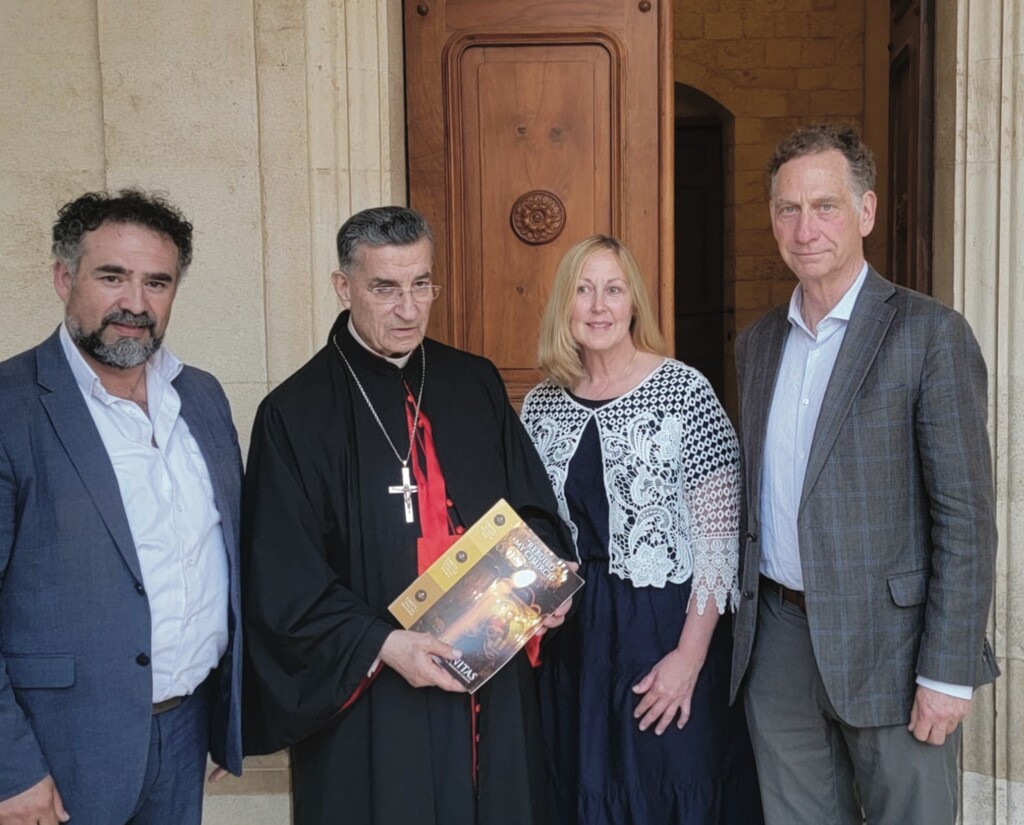
From left: Urbi et Orbi advisor Tony Assaf, His Beatitude Patriarch Bechara Boutros al-Rahi, head of the Lebanese Maronite Catholic Church, Urbi et Orbi Executive Director Deborah Tomlinson, and Urbi et Orbi Founder and President Dr. Robert Moynihan, at a meeting in Bkerké, Lebanon, on May 31, 2022. During the meeting, Dr. Moynihan presented the Patriarch with a dossier explaining the Unitas initiative of Urbi et Orbi Communications, which the Patriarch is holding
UNITAS PROJECTS IN LEBANON AND UKRAINE…
Two projects of Unitas have taken on an increased urgency over the past several months. Through our Unitas: Friends of Lebanon project and our Unitas: Friends of Ukraine and Russia project, we have continued in our efforts to reach out to our struggling brothers and sisters in Christ in the Middle East and in Ukraine.
Our Unitas: Friends of Lebanon project has now been active for almost two years. During this time, we have helped more than 100 Lebanese Christian families with food boxes, reached more than 1,300 students with scholarship aid, and recently provided water purifiers to 50 families in Beirut. The postponement of Pope Francis’ long-awaited visit to Lebanon will delay the focus of world attention on this ancient Christian homeland, but Unitas: Friends of Lebanon remains committed to bringing “short-term help” like food boxes and water filters, and “long-term hope” by helping children return to school after pandemic and economic crisis.
On April 29, 2022, our Unitas: Friends of Lebanon group had its second videoconference of the year (the first was held on February 25). These meetings take place bi-monthly, on the last Friday of the month, and are open to all who wish to become “Friends of Lebanon.”
During the meeting, we were delighted to receive confirmation that 50 water purifiers have arrived in Lebanon and will be distributed to needy families by our partners in Beirut.
Clean drinking water can be difficult to come by these days in Beirut, as industrial water purification systems are often turned off during power outages.
The purifiers we gave Beirut families are extremely easy to operate: after adding table salt to water, each device can produce enough chlorine to disinfect up to 20 liters of water at a time, in line with CDC Safe Water System requirements. Each device has a lifetime capacity of 124,000 liters, with no replacement parts needed. These water purifiers will make a real difference in the lives of hundreds, and we thank all those who made their safe arrival possible. We are especially grateful for the support of the charitable organization “Make Water Safe for the World,” which donated the water purifiers to Unitas: Friends of Lebanon. Thank you!
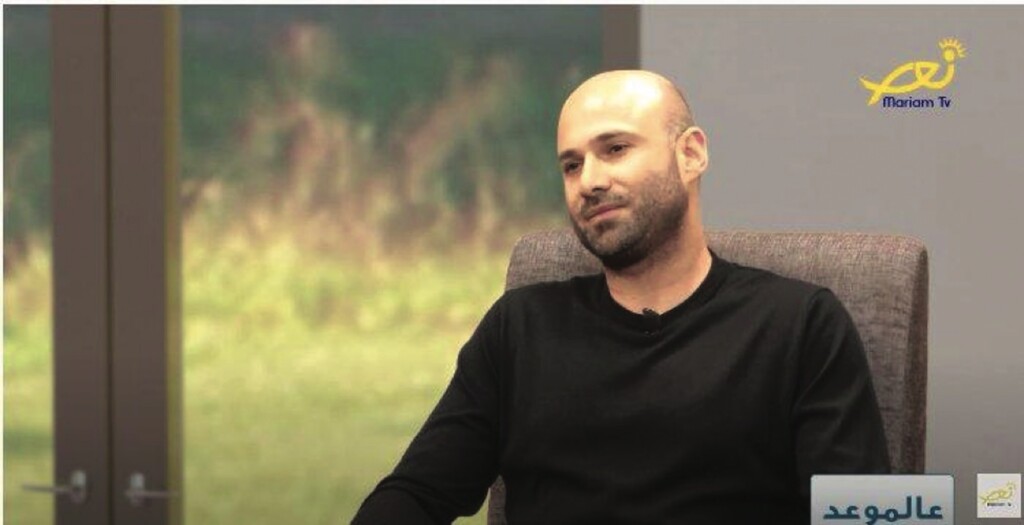
Georges Assaf, who has been one of the partners of our Unitas: Friends of Lebanon initiative for nearly two years, appeared on Lebanese channel “Mariam TV” to discuss his work with Lebanese youth
UNITAS ON TELEVISION
Unitas: Friends of Lebanon was also recently mentioned on a television program in Lebanon: the “Mariam TV Lebanon” recently interviewed Aya Naimeh and Georges Assaf about their work supporting Lebanese youth.
Aya and Georges have been working with Unitas: Friends of Lebanon for almost two years now. It is in large part thanks to their expertise and tireless labor that we have been able to implement various projects, including food boxes and scholarships, on the ground in Beirut.
Through our partnership with Georges and Aya, Unitas: Friends of Lebanon has been able to reach 1,385 students across Lebanon, providing funding for scholarships to help keep them in school during this difficult time.
We’ll continue to work with them as they and others build the country’s future.
BRINGING HELP AND HOPE TO UKRAINE
In addition to our work in Leb anon, we have recently begun a project to aid people affected by the war in Ukraine — Unitas: Friends of Ukraine and Russia.
Unitas: Friends of Ukraine and Russia is using donations from people like you to enable native Ukrainians, led by our good friend Sergii Bortnik, of the Kyiv Seminary of the Ukrainian Orthodox Church (Moscow Patriarchate), to bring direct financial help to hungry families, the elderly and handicapped, the displaced and forgotten.
In the midst of a full-scale war raging around them, countless Ukrainians are struggling to care for their families, scavenging for food and clothing, living in bomb-ravaged buildings.
Many have managed to leave the country to become refugees in other lands; but many more cannot.
These include families with young children, the elderly, children and adults with Down Syndrome… Many who become invisible in “the fog of war” and yet need the most help.
Jesus said, “As often as you have done it to the least of My brothers, you have done it to Me.”
We cannot let these most vulnerable people — all of them God’s children, but most of them also our Christian brothers and sisters — be left without help, and without hope.
Sergii and the people that he works with are not a large-scale NGO; they are Ukrainian neighbors helping neighbors. With their assistance, we can bring hope in the midst of suffering.
…AND EVENTS IN ITALY AND WASHINGTON, D.C.
Over the past several months, we have been seeking a way to continue our work for unity in the Church, in the face of a war in Europe that threatens to divide the Orthodox world and sever many links between Orthodox and Catholics. We are now organizing an event which will bring together Catholic and Or tho dox representatives, to be held later this summer in Italy. More information about this event will be coming soon in Inside the Vatican magazine and on the Urbi et Orbi website.
Finally, please mark your calendars for our yearly Unitas Signature Event, which will be held October 4 in Washington, D.C. Last year’s Unitas retreat (see Winter 2022 Communiqué), was a unique experience, filled with profound personal encounters and spiritual reflection, and this year’s event at Washington’s breathtaking Franciscan Monastery of the Holy Land promises another fruitful experience. We hope to see you there!
“WRITER’S CHAT” FEATURES MARY STANFORD, AUTHOR, COLLEGE PROFESSOR AND MOTHER OF SEVEN
Mary Ellen Stanford’s soon-to-be-released new book, The Obedience Paradox: Finding True Freedom in Marriage, is the fruit of both scholarship and experience: she is an adjunct professor at Christendom College with a Master’s degree in Theology from the John Paul II Institute for Studies on Marriage and the Family, and she is a wife and mother of seven.
She will join Inside the Vatican’s online “Writer’s Chat” on August 12 to discuss her article on Edith Stein in the July-August 2022 issue of Inside the Vatican, and the 20th-century saint’s thought on recognizing and developing Woman’s unique gifts — what Pope John Paul II would later call “the feminine genius” — in an era of mass confusion, even among Catholics.
Reflection
“The glory of God is man alive”
St. Irenaeus, the Church’s “Doctor of Unity”
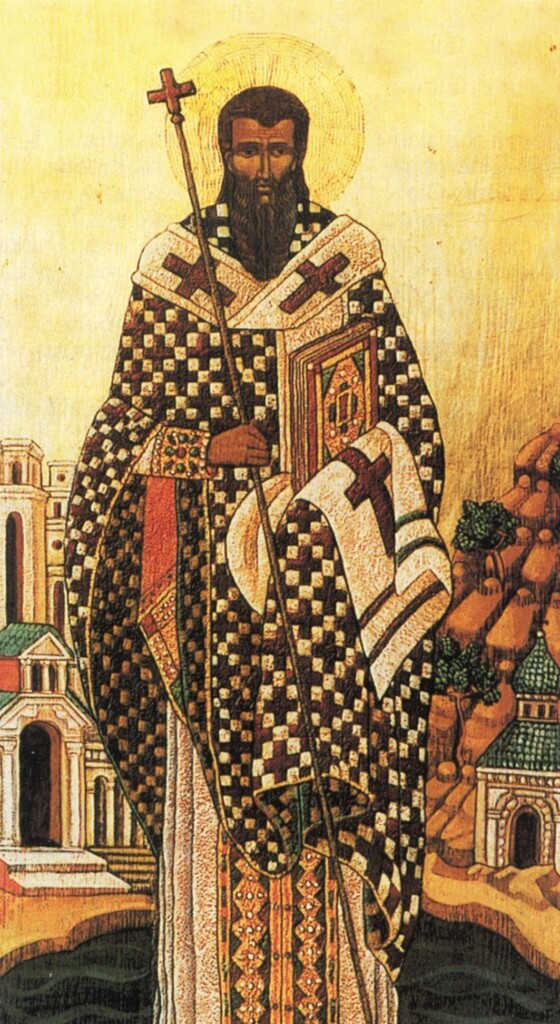 By Robert Moynihan
By Robert Moynihan
St. Irenaeus of Lyon, one of the great bishops and theologians of the early Church, was declared a Doctor of the Church and given the specific title of “Doctor of Unity” (“Doctor Unitatis”) by Pope Francis on January 21 of this year.
“May the doctrine of such a great Master encourage more and more the path of all the Lord’s disciples towards full communion,” Francis wrote in the decree proclaiming him a Doctor of the Church.
Though his exact birth date is unknown, Irenaeus was born of Greek parents in Asia Minor. According to his own writings, he, as a child, heard and saw St. Polycarp, the last known living connection with the Apostles, in Smyrna, before that aged Christian was martyred in 155. Eusebius of Caesarea also notes that, after persecutions in Gaul in 177, Irenaeus succeeded the martyred Pothinus as bishop of Lug dunum. According to Eusebius, who wrote a history of the Church in the 4th century, Irenaeus, prior to his becoming bishop, had served as a missionary to southern Gaul and as a peacemaker among the churches of Asia Minor that had been disturbed by heresy.
Historical sources testify to a close cultural connection between Asia Minor and southern France (the Rhône valley) during the 2nd century. According to tradition, St. John the Apostle, as a very old man who had “seen the Lord” (i.e., Jesus), lived at Ephesus in the days when Polycarp was young. Thus, there were three generations between Jesus of Nazareth and Irenaeus of southern France.
This era was a time of expansion and inner tensions in the Church. In many cases, Irenaeus acted as mediator between factions. The Churches of Asia Minor continued to celebrate Easter on the same date (the 14th of Nisan) as the Jews celebrated Passover, whereas the Roman Church maintained that Easter should always be celebrated on a Sunday (the day of the Resurrection of Christ). Mediating between the parties, Irenaeus stated that differences in external factors, such as dates of festivals, need not be so serious as to destroy Church unity.
In the course of his work as the second bishop of Lyon, he came up against heretical doctrines and movements that insisted that the material world was evil. He rebutted these Gnostic errors in his lengthy book Against Heresies, which is still studied today for its historical value and theological insights.
A shorter work, the Proof of the Apostolic Preaching, contains Irenaeus’ presentation of the Gospel with a focus on Jesus Christ’s fulfillment of Old Testament prophecies.
St. Irenaeus is perhaps best known for an oft-cited phrase which is in just a few words a kind of synthesis of Christian theological and anthropological thinking: “The glory of God is man alive, but the life of man is the vision of God.”
The very existence of a universe in which there are persons, capable of love and of choice, beings who, living fully, are able in their free will to choose the right and the good and the just, are able to sacrifice themselves for others in selfless love, to be faithful, and to set out on the path toward holiness, toward full communion with the holy, with the divine — all this, and just this, reveals God’s glory, is God’s glory.
And then St. Irenaeus adds: “But the life of man is the vision of God.”
And with this phrase, Irenaeus’ thought folds back upon itself, deepens, intensifies, for what makes man into “the glory of God” — what makes man alive, what gives life to men and women — is “the vision of God.”
Seeing God.
Seeing the holiness, eternity, lovingkindness, justice and mercy of God, and in seeing it, comprehending it, grasping it, being inspired by it… and entering into it ourselves.
So, for Irenaeus, man receives his true life from God by seeing God, and living fully in Him; he becomes, marvelously, “the glory of God.”
Director’s Report
Lebanon: 2,000 years of religious faith, now facing hunger and famine
With a promised papal visit in the offing, young Lebanese are struggling to build “a better Lebanon”
By Christopher Hart-Moynihan, Director of Friends of Lebanon
Lebanon is a country where the Church has thrived since the days of the first apostles.
It is known from the New Testament that during His life Jesus preached at Tyre and Sidon, two ancient cities located in modern-day Lebanon, and many also believe that his first miracle, turning water into wine at the wedding at Cana, took place in the village today called Qana, in southern Lebanon.
Lebanon is also a country where the multiplicity within the Christian faith is on full display: in a population of around 2 million Christians, there are substantial communities of Maronite Catholics, Greek Catholics, Greek Orthodox, Oriental Orthodox (including Syriacs, Armenians, and Copts), Church of the East (Assyrians), and Protestants.
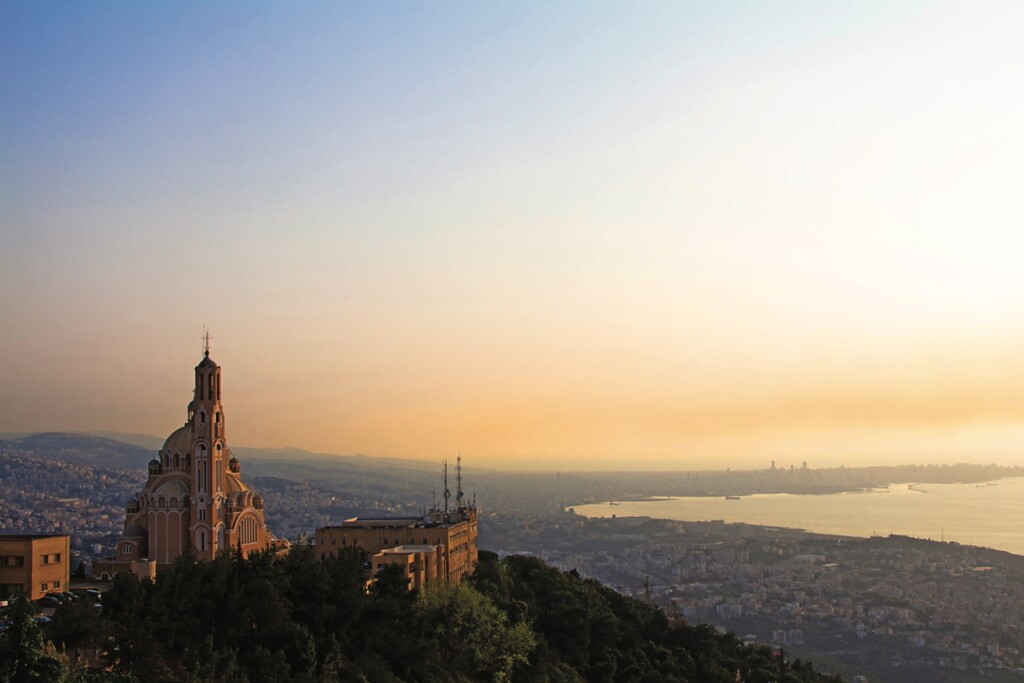
A view of the Melkite Greek Catholic Basilica of St. Paul in Harissa, north of Beirut, Lebanon
One recent article in L’Osservatore Romano quotes Sister Jocelyne Chahwane, an “intrepid and restless” member of the Congregation of the Maronite Sisters of the Holy Family living in the village of Fatka, 30 kilometers north of Beirut: “All our neighbors are Muslim countries; here, however, traditionally, there is a diversity of rites: the Maronites, the Orthodox. However, these Christians are those who suffer the most; the Shiite Muslims have help from Iran, the Sunnis from Saudi Arabia. What about the Christians? Yet Pope Francis, praying for us, said we are the last bastion of Christianity in the Middle East. Today, the big question is: will Lebanon remain a Christian country or not?”
Through our Unitas: Friends of Lebanon initiative, we will be leading a pilgrimage to Lebanon in October of this year, to talk with people like Sister Jocelyne and visit places like Fatka, where, because of the collapse of tourism and the economy, “nobody comes anymore,” in order to bring a simple message: that they are not alone. (More information about this pilgrimage can be found on page 7 of this Communiqué.)
In addition to a years-long economic crisis that has spurred massive emigration by Lebanon’s Christian community, Lebanon may now be facing an even graver situation.
“In Lebanon, the message must be the global famine,” one “Friend of Lebanon” in our bi-monthly videoconference, held on April 29, told us. “Lebanon [and other Middle Eastern countries] get 60% of their food supplies from Ukraine and Eastern Europe. [The food shortages] will affect 60% of the population in the Middle East and North Africa.”
We began supporting Lebanese Christian communities with food boxes in 2021, and Unitas: Friends of Lebanon has brought “short-term help” to more than 100 needy families in Beirut since the 2020 port explosion, in the form of food boxes containing pasta, oil, salt, rice, lentils and beans. We are committed to monitoring the situation on the ground in Beirut to see how we can combat hunger and malnutrition if the food crisis deepens, and to make sure these people continue to receive the support they need.
A few of the “Friends of Lebanon” in our videoconference also shared their views on the Pope’s promised visit to the country:
“The Holy Father should highlight regions in Lebanon that are functioning, that have the rule of law. Then have a global conference for Lebanon. It’s not about money. It’s about an education for solidarity. We want to do fasting in solidarity with Lebanon. And send the food to Lebanon.”
All of us in the call agreed that we would make an effort to fast every week, on Thursday, in solidarity with Lebanon.
The meeting ended with inspiring words from Aya Naimeh, our friend and colleague, on the personal sacrifices she has made to stay in Lebanon, working for a brighter future:
“Even my husband is not [with me] in Lebanon because we need [financial] support. I want to be here. I want to fight the fight here. There will be a better Lebanon, through us. Not through anybody else.”
Please consider becoming a “Friend of Lebanon,” and help us to bring “short-term help” and “long-term hope” to the land where Jesus Christ walked and performed miracles.
JOIN US!… BE THE HANDS THAT HELP BRING UNITAS TO THE CHURCH!
Visit https://urbietorbicommunications.com/unitas-come-rebuild-my-church/
Email us at [email protected] or call +1.202.536.4555
to see how you can join us.
Profiles
People: Our Most Valuable Asset
Sergii Bortnik
The process of seeking peace, reconciliation and unity between Churches is fraught with historical grievances and rivalries, as well as seemingly insurmountable present challenges. For those working in the area of Ecumenical or “Inter-Church” Relations, both a calm personal disposition and a solid theological grounding are essential in order to deal with differences in a spirit of faith, joy, and hope. Sergii Bortnik is one man who is ideally equipped for this work. Now he has put his diplomatic skills to use helping his own local community in Ukraine as our partner on the ground with Unitas: Friends of Ukraine and Russia.
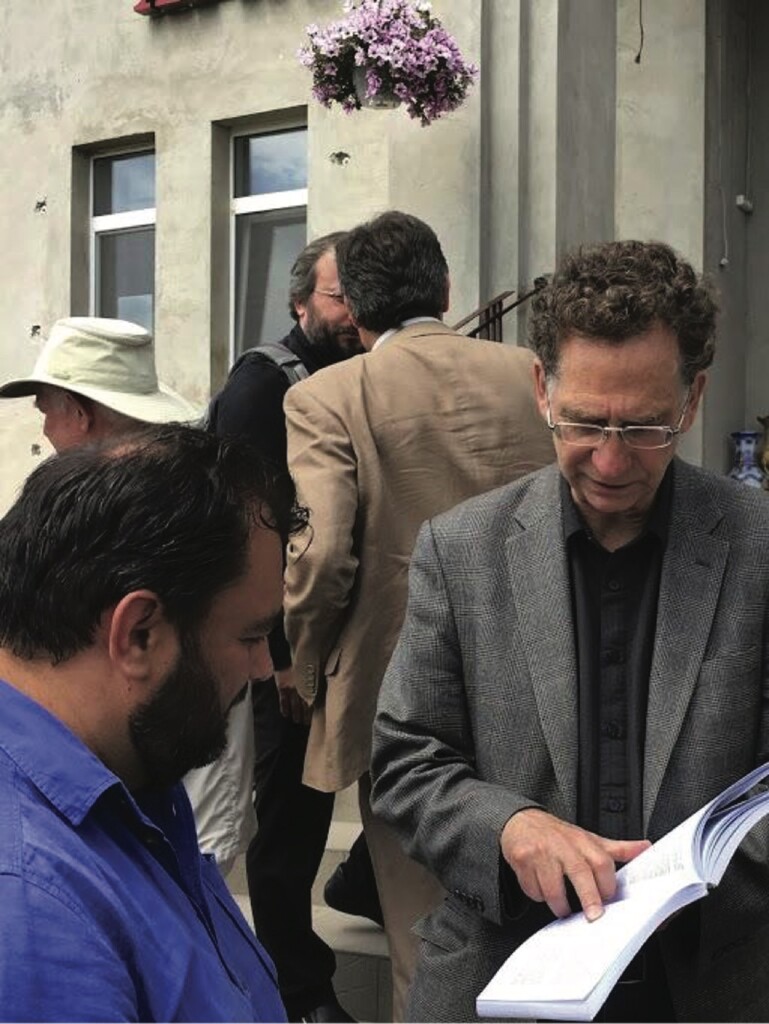
Sergii with Dr. Robert Moynihan during a visit to Ukraine in 2017, five years ago
We first met Sergii in July 2017, when he picked us up in Boryspil airport in Kyiv as we were beginning our Urbi et Orbi Pilgrimage to Ukraine, Russia, and Italy. Over several days spent in and around Kyiv, Sergii was an incredible host and guide, organizing our stay in the Pecherskaya Lavra (the spiritual center of Orthodoxy in Ukraine) and visits with officials in the Ukrainian Orthodox Church. As we got to know Sergii, we came to appreciate his down-to-earth personality, as well as his diplomatic acumen (he worked for many years in the office of Ecumenical Relations for the UOC, during which he spent time living in Germany, and he speaks four languages: Russian, Ukrainian, English, and German).
On the day of our departure, Sergii even invited us to his family’s “dacha” in the Ukrainian countryside after our travel plans had been upended by multiple flight delays. We spent an entire afternoon with his family, eating fruits and vegetables from his garden and speaking with his sister, who has a child with Down syndrome and is active in the Down syndrome community in Ukraine.
Since our introduction to Sergii, we have met several more times and helped facilitate a visit to Rome where he met several Vatican officials working in ecumenical relations. He now is working for the Kyiv Seminary of the Ukrainian Orthodox Church (Moscow Patriarchate).
As the conflict in Ukraine intensified during the first half of 2022, we were in contact with Sergii and several other individuals living in and around Kyiv as we sought to discern the way in which we could best support those who were most affected by the conflict. Sergii suggested that we assist with work that he had begun with friends and colleagues at the Kyiv Seminary.
Through our direct connection with Sergii, we were recently able to send financial support for elderly people and families with children in the town of Boryspil, south of Kyiv, who have been displaced or otherwise affected by the war. In addition, these funds have gone to support a bakery that employs individuals with Down syndrome in the area.
We are looking forward to continuing our collaboration with Sergii, and helping to bring hope to the “least of our brothers and sisters” in Ukraine through Unitas: Friends of Ukraine and Russia.
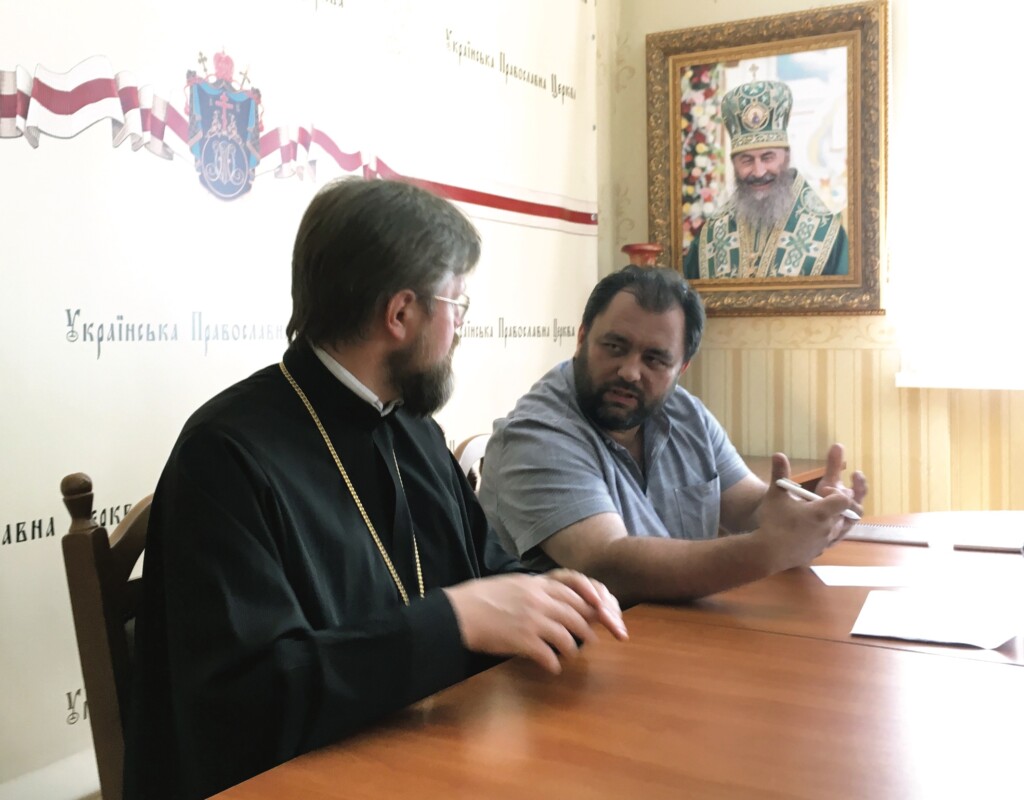
Sergii Bortnik in Ukraine.
Pilgrimages
Land of Cedars, Land of Faith
Lebanon, the meeting point of East and West, holds an ancient heritage of faith and a natural beauty celebrated since Old Testament times
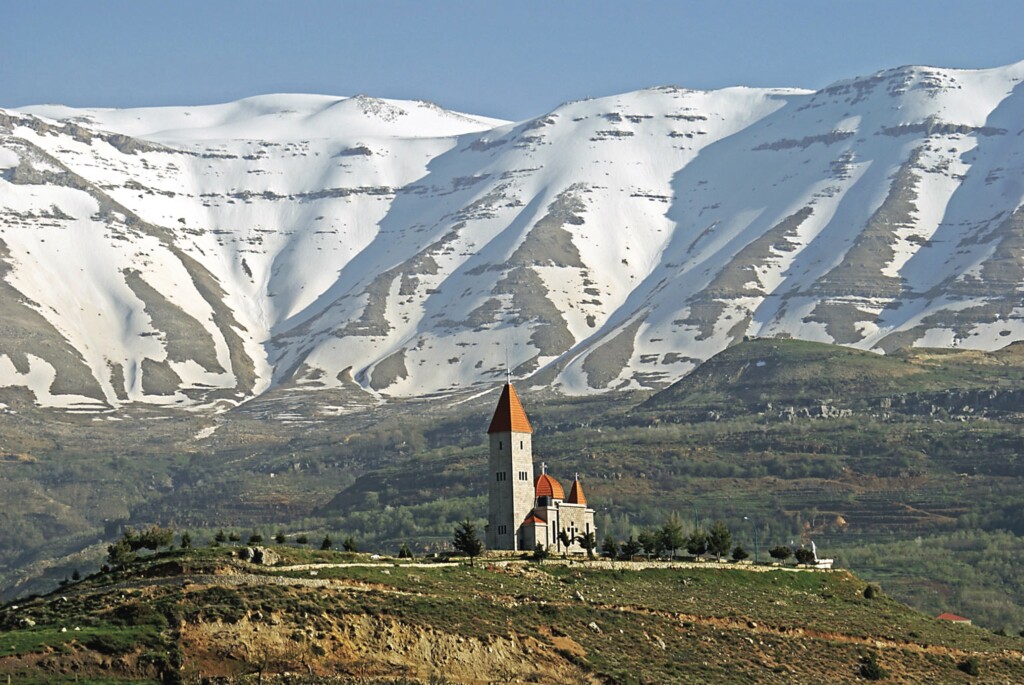
The Church of the Sacred Heart in Bcharre, northern Lebanon. Bcharre is located near the Holy Valley of Kadishah, where the Cedars of Lebanon mentioned in the Bible still grow today
Inside the Vatican Pilgrimages wants to introduce you to an incredibly beautiful, historic land of faith: Lebanon.
We have been working with friends in Lebanon for some time, bringing supplies to areas of the capital city, Beirut, which were destroyed by last year’s blast… but the nation of Lebanon is a lovely land, rich with spiritual and historical significance, and we are excited to be able to show you firsthand this land of spreading cedars, ancient rock faces and fertile valleys.
Beginning in Beirut, the meeting-point of East and West, and continuing on to Bkerké, site of the episcopal see of the Maronite Catholic Patriarchate of Antioch, we will meet with leaders of the Maronite Catholic Church and other Christian churches in Lebanon.
Then we’ll visit the breathtaking Kadisha Valley in the north of Lebanon (“Qadisha” means “holy” in Aramaic), the site of some of the oldest Christian monastic communities in the world, which are still active today.
The Kadisha Valley has been continuously inhabited since the 4th century B.C. In the early centuries of Christianity, monks and hermits chose to live in its many caves and secluded natural grottoes — to be alone with God and seek His face.
The monastic tradition of the Kadisha Valley continues today, in the midst of the fresh odor of pines and cedars, in the quiet where sometimes the only sound is the running water of the nearby river. Here you can visit the many cave chapels, and light a candle under their overhanging rock ceilings, or climb a series of carved stone steps to a shrine – it might be a shrine to St. Maron or St. Charbel — built high up into a steep rock face.
Our visit to northern Lebanon may also include a chance to visit the Forest of the Cedars of God, the site of the “Cedars of Lebanon” mentioned 103 times in the Bible, which were used by King Solomon to build the Temple in Jerusalem.
But beyond the incredible natural beauty of the country, we will experience Lebanon’s ancient heritage of faith. The Gospel mentions that Jesus Himself was in Cana for a wedding — the town today called “Qana” in southern Lebanon, across the Israeli border.
Many saints, like St. Maron and St. Charbel, im pressed their form of desert spirituality on Lebanese Christianity over the centuries. In the 20th century, the Catholic French left their mark on Lebanon during their administration of the country after the Partition of the Ottoman Empire in 1920, instituting religious houses, schools and hospitals. We’ll meet some of the people who carry on their work today.
We’ll explore all this and more during Inside the Vatican’s pilgrimage to Lebanon, coming September 2022.
“To go on pilgrimage really means to step out of ourselves in order to encounter God where he has revealed himself, where his grace has shone with particular splendor and produced rich fruits of conversion and holiness among those who believe.” – Pope Benedict XVI
Digital Platforms
Urbi et Orbi Communications’ Digital Platforms
Bringing the “Heart of the Church” to a global audience
Virtual pilgrimages, roundtable discussions, Vatican news and commentary and spiritual reflection are all just a click away with Urbi et Orbi Communications’ digital platforms on the internet.
Virtually anyone, anywhere can access our three websites – UrbietOrbiCommunications.com; InsideTheVatican.com; and InsideTheVaticanPilgrimages.com. They each have a different focus but all three are chock-full of opportunities for you to grow in your faith, your knowledge and your experience of the Church’s great pilgrimage destinations, its saints and its scholars and its present-day mission.
We post our original video content – virtual pilgrimages, talks, interviews and events – on our YouTube channels: Urbi et Orbi Communications and Inside the Vatican Pilgrimages. Visit our channels and be sure to subscribe so you don’t miss any of our great content.
We will be traveling to Quito, Ecuador at the beginning of 2022 to visit the shrine of Our Lady of Good Success, and you will be able to follow our journey through videos posted on these channels.
You can find Urbi et Orbi Communications, Inside the Vatican magazine, Inside the Vatican Pilgrimages and Robert Moynihan on Facebook, Twitter and Instagram too!
Receive Inside the Vatican founder and editor-in-chief Robert Moynihan’s widely-read and highly-respected email bulletin, The Moynihan Letters. Visit InsidetheVatican.com to subscribe.
Did you know that you can also read Inside the Vatican on your digital device? Each issue of Inside the Vatican magazine is available to subscribers in digital form online. Visit Issuu.com/InsideTheVaticanMagazine.
We all belong to the visible Body of Christ on earth, the Catholic Church. Urbi et Orbi Communications is committed to keeping us all connected!
Save the Date
Urbi Et Orbi Communications will hold the inaugural international dinner for
Unitas: Come, Rebuild My Church on October 4, 2022, in beautiful Washington, D.C.
Join us for an inspiring and revitalizing evening and learn how you can be part of our new
Unitas initiative, working to bring unity to the Catholic Church,
between Catholics and the Orthodox, and between each soul and God.
CALL US at +1.202.536.4555, email us at [email protected],
or go to https://UrbiEtOrbiCommunications.com/unitas-come-rebuild-my-church/
for more information or to reserve a place at this historic dinner!





Facebook Comments